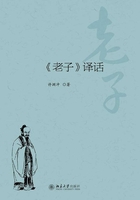第十三章 论荣辱
第十二章谈到人的欲望,第十三章谈对人和对自己的态度。第一句说:“宠辱若惊,贵大患若身。”这句话有两种解释:一种说:得到好评或者受到批判,总会感到不安,仿佛大难临头一般,那是把荣辱看得和身家性命一样重要了,也是把“贵”当作动词。另一种解释把“贵”当作名词,和“患”相对,说荣辱会扰乱心灵,富贵和祸患却会影响身体。下面看看译文:
1.Praise and blame disturb the mind;fortune and misfortune affect the body.(高等教育出版社)
2.Praise and blame disturb the mind for they are considered not as great trouble but as treasure as dear as one’s body or life.
第一种译文把“贵”当作名词,古人有这样理解的;第二种译文当作动词,这是现代人的看法,哪种解释好些,要看下文再说。
第二句说:“何谓宠辱若惊?宠为上,辱为下,得之若惊,失之若惊,是谓宠辱若惊。”为什么说荣辱使人不安?好评使人向上,感到高兴;批判使人垂头丧气,感到痛苦,都会不安。译文如下:
Praise and blame are like ups and downs.The mind is troubled with rise and fall, so is it troubled by praise and blame(so will it feel happy when praised, and downcast when blamed).(高等教育出版社)
译文说:好评和批判会使人感到上下升沉,高低起落,心灵会受到外界的影响,自然也会随着赞扬和批评而波动。
第三句说:“何谓贵大患若身?吾所以有大患者,为吾有身,及吾无身,吾有何患?”荣辱都是祸患,为什么要把这种祸患看得像身家性命一样重要?这是因为我老想到自己,如果我不想到自己,哪会有什么祸患呢?两种译文是:
1.How can fortune and misfortune affect the body?Because we have a body.If we had not a body, how could we be affected?
2.How can praise and blame be considered not as great trouble but as treasure as dear as one’s body or life?It is because he has a body.If he had not a body, how could he feel troubled?
第一种译文把“贵”当名词,第二种当动词,两种都说得通。
最后的结论说:“故贵以身为天下,若可寄天下;爱以身为天下,若可托天下。”这里的“贵”显然是个动词,说可贵的是,重要的是,要把自己看成天下的一分子,把天下看得和自己一样贵重,一样重要;最好能爱天下像爱自己一样,那就可以把天下交托给这种人了。结论就是“无私”二字,译文如下:
If you value the world as your body, then the world may confide in you.If you love the world as your body, then the world may be entrusted to you.
